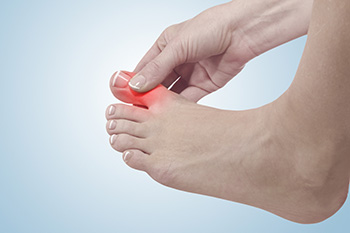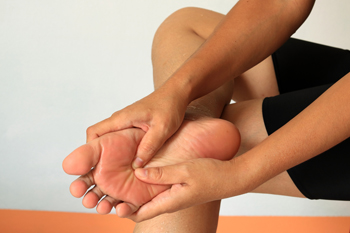

The most common cause of a dislocated toe is direct injury, either bumping into something solid or dropping something heavy on it. You most likely will feel extreme pain at the time of the injury, it will be hard to bend, or even move the toe; and it will swell, become bruised or lose feeling. Sometimes a loose ligament will cause a toe to dislocate, which is extremely painful. Avoid trying to pop the toe into place yourself, as this may cause further injury. The first thing to do is stop further activity, elevate the foot, immobilize it, and apply ice. Next, make an appointment with a podiatrist immediately. An X-ray may be required, followed by manipulating the bones back into place. Followup treatments include strapping the injured toe to the one next to it, alternating ice and heat, undergoing whirlpool treatments, and doing strengthening exercises. A podiatrist can properly diagnose the severity of your toe injury and propose the proper treatment plan for you.
A broken toe can be very painful and lead to complications if not properly fixed. If you have any concerns about your feet, contact one of our podiatrists from Achilles Foot Clinic. Our doctors will treat your foot and ankle needs.
What to Know About a Broken Toe
Although most people try to avoid foot trauma such as banging, stubbing, or dropping heavy objects on their feet, the unfortunate fact is that it is a common occurrence. Given the fact that toes are positioned in front of the feet, they typically sustain the brunt of such trauma. When trauma occurs to a toe, the result can be a painful break (fracture).
Symptoms of a Broken Toe
Generally, it is best to stay off of the injured toe with the affected foot elevated.
Severe toe fractures may be treated with a splint, cast, and in some cases, minor surgery. Due to its position and the pressure it endures with daily activity, future complications can occur if the big toe is not properly treated.
If you have any questions, please feel free to contact one our office, located in the South of Calgary, Alberta. We offer the newest diagnostic and treatment technologies for all your foot care needs.
 The group of nerves that connect the central nervous system to the rest of the body is known as the peripheral nervous system. There are three groups of nerves within this system, known as motor, sensory, and autonomic. If the nerves become damaged from an injury, infection, or specific medications, peripheral neuropathy may result. This can alter how the nerves normally function. The symptoms of motor neuropathy can include twitching, paralysis, or muscle cramps. Additionally, a tingling sensation, or a loss of balance may be indicative of sensory neuropathy. Autonomic neuropathy symptoms can consist of dizziness from low blood pressure, constipation, or bloating. Research has shown it may be beneficial to monitor glucose levels, and it can help to protect your feet by wearing shoes and socks. If you have any of these symptoms that are affecting your feet, it is suggested that you consult with a podiatrist who can properly diagnose neuropathy, and offer correct treatment options.
The group of nerves that connect the central nervous system to the rest of the body is known as the peripheral nervous system. There are three groups of nerves within this system, known as motor, sensory, and autonomic. If the nerves become damaged from an injury, infection, or specific medications, peripheral neuropathy may result. This can alter how the nerves normally function. The symptoms of motor neuropathy can include twitching, paralysis, or muscle cramps. Additionally, a tingling sensation, or a loss of balance may be indicative of sensory neuropathy. Autonomic neuropathy symptoms can consist of dizziness from low blood pressure, constipation, or bloating. Research has shown it may be beneficial to monitor glucose levels, and it can help to protect your feet by wearing shoes and socks. If you have any of these symptoms that are affecting your feet, it is suggested that you consult with a podiatrist who can properly diagnose neuropathy, and offer correct treatment options.
Neuropathy
Neuropathy can be a potentially serious condition, especially if it is left undiagnosed. If you have any concerns that you may be experiencing nerve loss in your feet, consult with one of our podiatrists from Achilles Foot Clinic. Our doctors will assess your condition and provide you with quality foot and ankle treatment for neuropathy.
What Is Neuropathy?
Neuropathy is a condition that leads to damage to the nerves in the body. Peripheral neuropathy, or neuropathy that affects your peripheral nervous system, usually occurs in the feet. Neuropathy can be triggered by a number of different causes. Such causes include diabetes, infections, cancers, disorders, and toxic substances.
Symptoms of Neuropathy Include:
Those with diabetes are at serious risk due to being unable to feel an ulcer on their feet. Diabetics usually also suffer from poor blood circulation. This can lead to the wound not healing, infections occurring, and the limb may have to be amputated.
Treatment
To treat neuropathy in the foot, podiatrists will first diagnose the cause of the neuropathy. Figuring out the underlying cause of the neuropathy will allow the podiatrist to prescribe the best treatment, whether it be caused by diabetes, toxic substance exposure, infection, etc. If the nerve has not died, then it’s possible that sensation may be able to return to the foot.
Pain medication may be issued for pain. Electrical nerve stimulation can be used to stimulate nerves. If the neuropathy is caused from pressure on the nerves, then surgery may be necessary.
If you have any questions, please feel free to contact one our office, located in the South of Calgary, Alberta. We offer the newest diagnostic and treatment technologies for all your foot care needs.
Have your child's feet been examined lately? Healthy feet are happy feet. If your child is complaining of foot pain, it may be a sign of underlying problems.
Always measure your feet if you have any questions about your proper shoe size. You can measure your own feet with a tape measure or ruler, paper, a writing implement, and a chair to sit on while measuring your feet. First, tape the paper to the floor so it will not move. Second, sit on the chair and put one foot on the paper. Make sure to wear socks or foot coverings that you plan to wear with shoes before placing them on the paper. Third, outline the outside of your foot with your pen or pencil. Do this for both feet to check subtle differences that might be present between your feet. Fourth, measure from the tip of the heel to the longest toe of your foot and make a note of the numbers. Finally, do some simple math – subtract 3/16 from the measurement you wrote down to account for the difference between your foot and the shoe. The result is your shoe size! If you have trouble measuring your feet properly or find that you are still not able to find comfortably fitting shoes, see a podiatrist for help in measurements, and shoe suggestions, or to help you detect any other problems that might be going on with your feet.
Getting the right shoe size is an important part of proper foot health. Seek the assistance of one of our podiatrists from Achilles Foot Clinic. Our doctors will provide the care you need to keep you pain-free and on your feet.
Getting the Right Shoe Size
There are many people who wear shoes that are the incorrect size, negatively affecting their feet and posture. Selecting the right shoes is not a difficult process, so long as you keep several things in mind when it comes to choosing the right pair.
As our feet hold our body weight and keep us moving, it is important to treat them right. Picking the right pair of shoes can provide your feet comfort and mobility without pain.
If you have any questions, please feel free to contact one our office, located in the South of Calgary, Alberta. We offer the newest diagnostic and treatment technologies for all your foot care needs.
Read more about Getting the Right Shoe Size: To Keep Your Feet Happy
If you have pain that is located anywhere on the sole of your foot—throughout the heel or in the arch—you may be suffering from plantar fasciitis. The discomfort associated with plantar fasciitis may be an aching or dull pain, or even a burning or sharp pain. Plantar fasciitis pain is typically at its most severe when you first wake up in the morning, or after periods of rest. What causes plantar fasciitis pain? It occurs when the plantar fascia tissue that spans the bottom of the feet and connects the toes with the heel becomes inflamed due to tiny micro tears. Plantar fasciitis is usually the result of repetitive overuse, however, there are other possible causes and a variety of contributing factors. A podiatrist can help pinpoint why you developed this condition, treat it accordingly, and help prevent it from returning.
Plantar fasciitis can be very painful and inconvenient. If you are experiencing heel pain or symptoms of plantar fasciitis, contact one of our podiatrists from Achilles Foot Clinic. Our doctors can provide the care you need to keep you pain-free and on your feet.
What Is Plantar Fasciitis?
Plantar fasciitis is the inflammation of the thick band of tissue that runs along the bottom of your foot, known as the plantar fascia, and causes mild to severe heel pain.
What Causes Plantar Fasciitis?
How Can It Be Treated?
While very treatable, plantar fasciitis is definitely not something that should be ignored. Especially in severe cases, speaking to your doctor right away is highly recommended to avoid complications and severe heel pain. Your podiatrist can work with you to provide the appropriate treatment options tailored to your condition.
If you have any questions, please feel free to contact one our office, located in the South of Calgary, Alberta. We offer the newest diagnostic and treatment technologies for all your foot care needs.
Your feet are covered most of the day. If you're diabetic, periodic screening is important for good health. Numbness is often a sign of diabetic foot and can mask a sore or wound.